Modernist Center of Gdynia
Śródmieście ([ɕrudˈmʲɛɕt͡ɕɛ] meaning "city centre", "downtown") is the central borough (dzielnica) of the city of Gdynia. It borders the following districts: Oksywie, Obłuże, Pogórze (all three from the north), Chylonia, Leszczynki, Grabówek (all three from the west), Forest Plots and Kamienna Góra (from the south), and the Baltic Sea.
Śródmieście | |
|---|---|
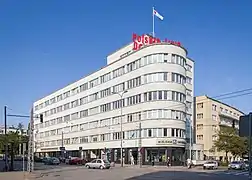 Modernist Office building of the Social Insurance Institution | |
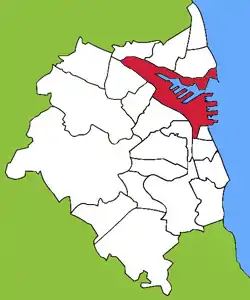 Location of Śródmieście within Gdynia | |
| Country | Poland |
| Voivodeship | Pomeranian |
| County/City | Gdynia |
| Area | |
| • Total | 11.49 km2 (4.44 sq mi) |
| Population | |
| • Total | 11,549 |
| • Density | 1,000/km2 (2,600/sq mi) |
| Time zone | UTC+1 (CET) |
| • Summer (DST) | UTC+2 (CEST) |
History
.jpg.webp)
Gdynia City Center was established mainly in the 1920s and 1930s. The modernist character of the center was created by such architects as Adam Kuncewicz and Roman Feliński.[1]
Gdynia's downtown survived the war practically undamaged. During the Nazi occupation, the Germans changed the name of the district to Stadtmitte.
In 1998, the Port district was incorporated into Śródmieście. Świętojańska is the oldest and most representative street in the city.
In 2015, the modernist layout of Gdynia City Center entered the list of historical monuments of Poland.[2][3]
On September 26, 2019, the Modernist Center of Gdynia was placed on the UNESCO tentative list (as of 2020, Poland lists six properties on its tentative list).[4] According to the nomination justification, the Modernist Center of Gdynia is unique as a heritage site of European town planning and architecture in which the ideals of Modernism have been confronted with the changing needs of a growing city and port.[5] As of 2020, the UNESCO World Heritage List includes urban layouts of Tel Aviv, Le Havre, Brasilia, and Asmara.[5]
Preservation and documentation
At the end of 2021, as part of the KLIMATyczne Centrum project, the authorities of Gdynia announced the creation of new green areas, limiting car traffic and parking spaces, introducing one-way traffic on Świętojańska Street, and redevelopment of Władysława IV, Wójta Radtke, Jana z Kolna and 3 Maja Streets, several buffer car parks on the outskirts of Śródmieście, revitalization of 10 Lutego, Starowiejska and Abrahama Streets, changes to Kaszubski Square and Aleja Jana Pawła II.[6]
.jpg.webp)
A historical importance of the city formed the basis of an exhibition called Gdynia – Tel Aviv and curated by Dr Artur Tanikowski.[7] It coincided with the centennial of the founding of Gdynia and Bahaus School, 110th anniversary of Tel Aviv. The exhibition explored architectural and cultural links of two ‘white cities’ by the sea, opened at the Polin Museum of Jewish History in 2019 and traveled to the Gdynia City Museum.[8]
Modernism in Europe – Modernism in Gdynia international conference takes place every year since 2007.[9] Gdynia Modernism Trail is created and maintained by the Gdynia Development Agency.[10]
Notable monuments
There are several facilities and institutions in Śródmieście:
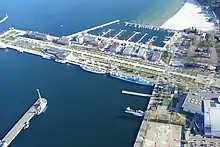
- Gdynia City Hall
- Gdynia District Court (Constitution Square 5)
- Gdynia Główna Railway Station (Constitution Square)
- City Market Halls (ul. Wójta Radtkego 36/40)
- Office building of the Social Insurance Institution (former PLO Building, ul. 10 Lutego 24, corner of ul. 3 Maja)
- BGK housing complex (ul. 3 Maja 27-31, corner of ul. 10 Lutego and corner of ul. Batorego)
- Port Construction Office (ul. Washingtona 38)
- Abraham's House (ul. Starowiejska 30)
- House of the Swedish Seaman (ul. Jana z Kolna 25)
Gdynia Seaport
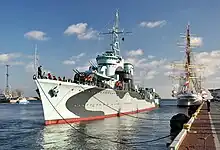
- Marine Station
- Southern Pier
- Gdynia Aquarium
- House of the Polish Sailor[11]
Modernist townhouses
- Pręczkowski Tenement House (Kościuszko Square 10-12)[12]
- Peszkowski Tenement House (Kościuszko Square 14)[13]
- Krenski House (ul. Świętojańska 55)[14]
- Orłowski House (ul. Świętojańska 68)[15]
- Hundsdorff House (ul. Starowiejska 7)[16]
.jpg.webp) Pręczkowski House
Pręczkowski House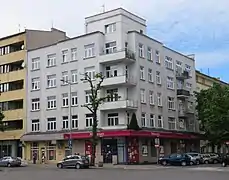 Peszkowski House
Peszkowski House_-_czupirek_2013.jpg.webp) Krenski House
Krenski House_(cropped).JPG.webp) Orłowski House
Orłowski House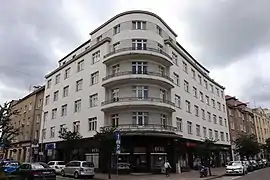 Hundsdorff House
Hundsdorff House
See also
- Geddes Plan for Tel Aviv
- Architecture of Poland
- WUWA, modernist urban area in Wroclaw, Poland
References
- "Wyborcza.pl". trojmiasto.wyborcza.pl. Retrieved 2022-04-20.
- "Gdynia - Historic Urban Layout of the City Centre - Zabytek.pl". zabytek.pl. Retrieved 2022-04-20.
- "Śródmieście Gdyni uznane za pomnik historii". trojmiasto.pl (in Polish). 2015-03-19. Retrieved 2022-04-20.
- Centre, UNESCO World Heritage. "Poland - UNESCO World Heritage Convention". UNESCO World Heritage Centre. Retrieved 2022-04-20.
- Centre, UNESCO World Heritage. "Modernist Centre of Gdynia — the example of building an integrated community". UNESCO World Heritage Centre. Retrieved 2022-04-20.
- "Wyborcza.pl". trojmiasto.wyborcza.pl. Retrieved 2022-04-20.
- ""Gdynia - Tel Aviv" - a temporary exhibition | Muzeum Historii Żydów Polskich POLIN w Warszawie". polin.pl. Retrieved 2022-04-20.
- "Gdynia & Tel Aviv: Two Cities Built with Hope for the Future | Feature". Culture.pl. Retrieved 2022-04-20.
- "Modernism in Gdynia and UNESCO". Śródmieście Morskie – Gdynia (in Polish). Retrieved 2022-04-20.
- "MODERNIZM GDYNIA Szlak modernizmu" (in Polish). Retrieved 2022-04-20.
- "Dom Żeglarza Polskiego, ob. Wyższa Szkoła Morska - Zabytek.pl". zabytek.pl (in Polish). Retrieved 2022-04-20.
- "Pręczkowski Family Tenement, currently a tenement house - Zabytek.pl". zabytek.pl. Retrieved 2022-04-20.
- "Kamienica Pręczkowskich - Zabytek.pl". zabytek.pl (in Polish). Retrieved 2022-04-20.
- "The Krenski Company Tenement House". Pomorskie.travel. Retrieved 2022-04-20.
- "The Albin and Marianna Orłowscy Tenement House". Pomorskie.travel. Retrieved 2022-04-20.
- "The Townhouse of The Hundsdorffs in Gdynia". Pomorskie.travel. Retrieved 2022-04-20.
External links
 Media related to Śródmieście (Gdynia) at Wikimedia Commons
Media related to Śródmieście (Gdynia) at Wikimedia Commons